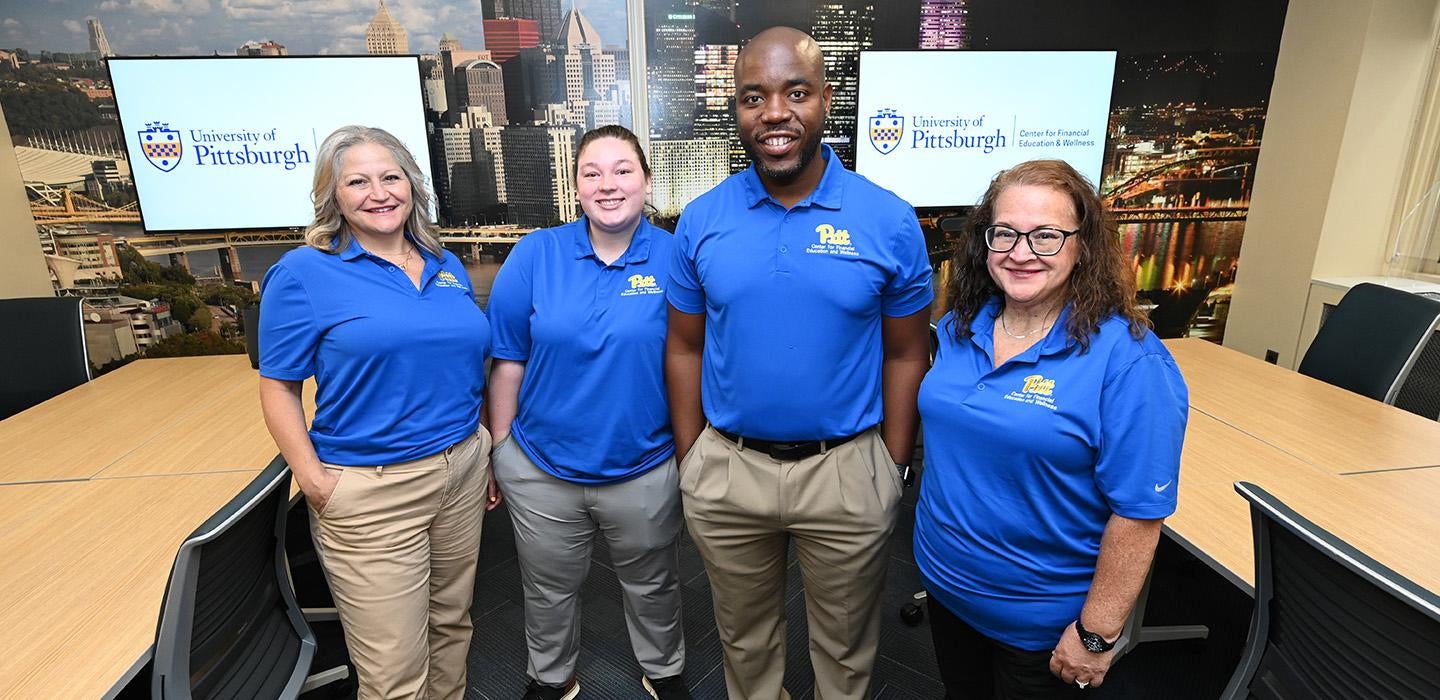
Subscribe to Pittwire Today
Get the most interesting and important stories from the University of Pittsburgh.Inflation, increased housing costs and other challenges are increasing financial burdens and stresses for Americans, including college students. The University of Pittsburgh’s Center for Financial Education and Wellness is responding by ensuring students leave equipped to manage money now and in the future.
“College is a transition period where we make various financial decisions that can impact us, sometimes, for the next 10 to 20 years,” said the center’s founding director, Joel Philistin.
The office, which opened in 2020, empowers students to make informed financial decisions through online learning, events, one-on-one appointments and presentations. Topics covered include budgeting, saving, building and establishing credit, managing student loan debt repayment and more..
A former banker, Philistin leads these efforts with Senior Assistant Director Janet McLaughlin, who has worked in financial aid since 1989 and has been with Pitt since 2005.
“Students didn’t have basic information about financial wellness, budgeting, savings and emergency funds,” said McLaughlin. “It’s not that they’re afraid to ask — they don't know what to ask because this is new or it’s something they assume they should know. We give them tools so they’re making decisions they’re comfortable with.”
And students are eager. Sophomore marketing and supply chain double major Marissa D’Ambrosio described personal finance as a “scary topic” among her friends.
“In high school, we didn't talk about it,” said D’Ambrosio. “It was like, ‘oh, we’ll figure it out later.’ When college came around, I saw money goes fast. Many of my friends talk about all the debt they’re going to come out of school with and how overwhelming that is. With Janet and Joel, I learned to make it less scary, so it’s not such a big fear later.”
While Pitt’s financial aid office focuses on helping students pay for college, the center’s goal is to educate students on managing finances now and post graduation . It does so, in part, with monthly workshops tailored toward specific topics. For example, sessions for students moving off-campus might spotlight budgeted grocery shopping and using credit cards responsibly. For graduating students, sessions focus on health insurance and student loan repayment. Others deal with what Philistin and McLaughlin said are students’ biggest interest: credit and investing.
“We are committed to going where students are,” said Philistin, noting his team’s willingness to present during student organizations’ general meetings.
[Pitt helps employees with finances, too — learn about loan repayment and forgiveness assistance]
D’Ambrosio, a Kappa Delta Sorority member and work-study peer educator for the center, said this strategy has been effective. “The center has done a good job expanding our knowledge and giving the best information,” she said, citing her ability to recommend money-saving resources like the Pitt Pantry.
D’Ambrosio, who is pursuing a global health certificate, learned about becoming a peer educator through TRIO Student Support Services and said finances were a concern when she started college.
[Here’s how TRIO helps first-generation students]
“I come from a low-income family, so it was important to educate myself on personal finance, handling loans and things some wouldn’t figure out until they’re older,” she said. “I wanted to be proactive since I didn’t have a strong foundation.”
D’Ambrosio and other peer educators were invited to attend the 2023 Higher Education Financial Wellness Alliance Summit hosted at the University of Oregon. The Higher Education Financial Wellness Alliance is a network of professionals and institutions driven to advancing student success through financial wellness. Pitt will host the conference next year.
“Financial wellness is in a cutting-edge moment,” said Philistin. “There’s good momentum, and it’s expanding or growing in higher education.”
Still, students like D’Ambrosio are reaping benefits of that momentum now.
“Pitt does a good job of supporting students,” D’Ambrosio said. “I can ask Janet and Joel any questions. Without them I would feel so lost, and I want other students to know they can also ask questions and for help.”
Register for the Sept. 6 Navigating Student Loan Repayment session and see more of the center's upcoming events.
6 tips to begin your financial wellness journey
- Budget. “A budget is the foundation of your financial goals,” said Philistin. “When we create a budget/spending plan, it feeds into the things we want to accomplish, whether that’s investing or traveling the world”. D’Ambrosio suggested finding an app to help, like Peach.
- Save. “Even if it’s $10 a month,” Philistin said. “Start separating your checking account from your savings account.”
- Pay interest on your student loans now if you can. “You don't have to wait to begin paying interest,” said Philistin. “That doesn't mean go into full repayment now, but make small payments here and there, so you have less debt by the time you graduate.”
- Consider credit an asset. Credit is helpful in purchasing assets like real estate and cars. Avoiding carrying credit card balances on sneakers, clothes or items that offer short term value. Practice responsible credit habits.
- Learn from mistakes. “When you’re budgeting, mistakes are going to happen,” said McLaughlin. “Learn from those and give yourself grace. Students will beat themselves up, but it’s going to happen. Fix it and move on.”
- Find the right lender. “Finding a lender that works is important,” said D’Ambrosio. “My first year, I went with the bank next to my house. I didn't do any research. The interest rate was high.” This year she researched others and found a bank with a lower interest rate.
— Kara Henderson, photography by Aimee Obidzinski


